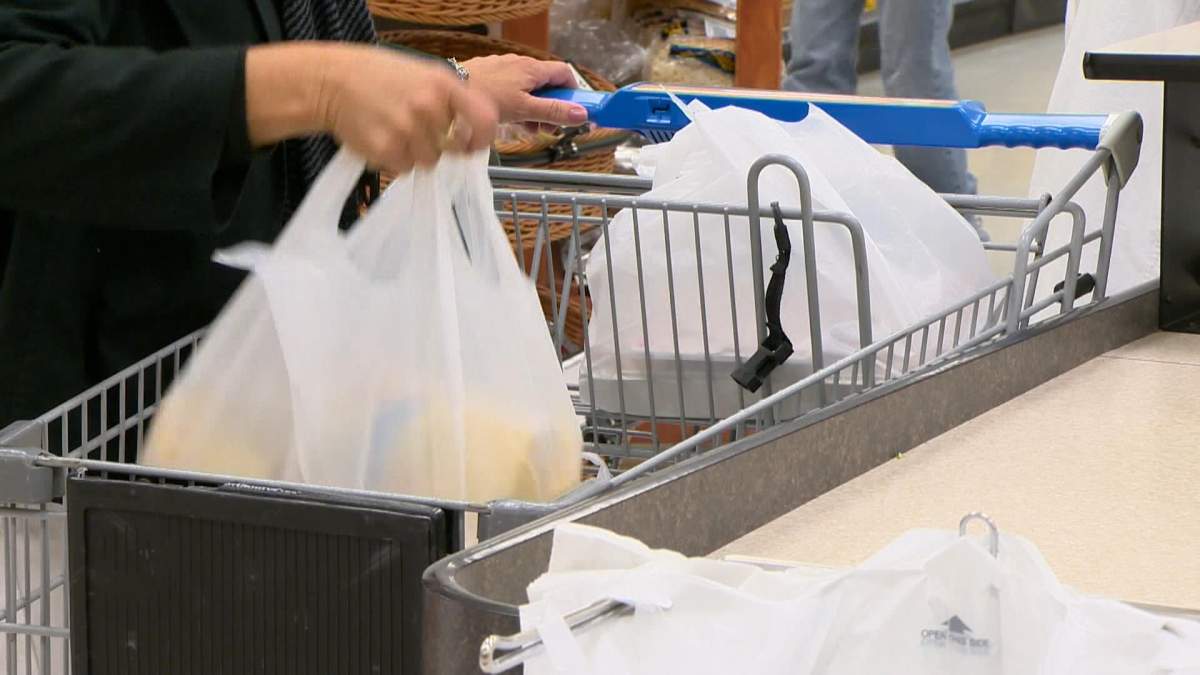The Nova Scotia single-use plastic bag ban takes effect Friday, meaning businesses will no longer be allowed to provide those bags to customers.

Bringing your own reusable bags when going shopping is “the best way to protect our environment,” the province says.
This ban is part of the Plastic Bags Reduction Act which was introduced by the province in October of 2019.
“It is a fantastic first step. It is, however, a first step, and we do need additional steps, like extended producer responsibility and more leadership from our government to ensure that this is the beginning of the conversation and no where near the end,” said Marla MacLeod, director of programs with the Ecology Action Centre.
“And so I think we can really make headway in reducing the plastics that we’re creating and thus the plastics that end up in our environment.”
Last month, the province questioned its Oct. 30 deadline as a global pandemic has ensued, and caused many changes to the way consumers purchase items, like groceries.
On Sept. 25, the province told Global News in an email, “Nova Scotia Environment is seeking input from Dr. Strang’s office about the use of reusable bags during COVID-19. We anticipate we will have direction in the next few weeks.”
Global News reported that research conducted by the Centers for Disease Control and Prevention in the United States indicates there isn’t a significant risk of virus transmission through the use of reusable bags.

Dr. Lisa Barrett, a medical doctor and infectious disease expert, said delaying the ban wouldn’t do much to prevent the spread of the disease.
“If people are following all the other rules and bagging their own groceries, then it is not to me much more likely that you get COVID-19 from a reusable bag than you would from an item that’s on the shelf that half a dozen people have touched during the day,” she told Global News in September.

Get daily National news
With Nova Scotia’s COVID-19 cases remaining under control in the fall, the province announced on Tuesday it is moving ahead with its original deadline.
The law will apply to all businesses, not just grocery stores.
According to the province, businesses that have plastic bags remaining in stock on Friday will not be able to use them for customers.
“They can recycle the bags, sell them or ship them to a business location in a province without a plastic bag ban. They can also donate them to a charity, like a food bank, that can use plastic bags when serving their clients,” said a release.
Businesses can provide reusable or paper bags to customers. While there are no rules around paper bags, the province recommends choosing bags that are made from at least 40 per cent post-consumer recycled paper.
“Businesses aren’t allowed to provide bags made from biodegradable or compostable plastic,” the province said in a release.

In addition, it is up to individual businesses to decide whether they want to charge for reusable bags and what they do with that money.
The province says exceptions to plastic bag use is made for:
- loose bulk items like fruit, vegetables, nuts, grains or candy
- food isn’t pre-packaged
- small hardware items like nails, nuts and bolts
- frozen foods, meat, poultry or seafood, whether it’s prepackaged or not
- prescription drugs from a pharmacy
- products that can’t fit in a reusable bag
- transporting dry cleaning
- packaging medical supplies and health services
- wrapping flowers or potted plants
- protecting tires
- transporting live fish
- home-delivered newspapers, flyers and mail
- packaged items containing liquids, like soup, that might leak during transport.
More information on the Nova Scotia Plastic Bags Reduction Act is available on the provincial website.








Comments
Want to discuss? Please read our Commenting Policy first.